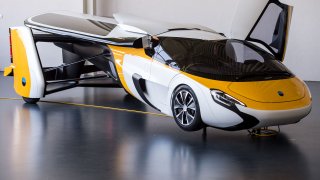
- Flying cars could be commercially available in 2024, but rules for managing this form of air traffic are still a concern, said Hugh Martin, chief executive officer of Lacuna Technologies.
- Some people will be able to afford flying cars, but most people will likely still travel on the road in electric vehicles or self-driving cars, he said.
- "Where I think they do have … an application though, is carrying the freight and packages," Martin said. "I think that's going to be a very big deal."
Flying cars could be commercially available in 2024, but regulations for managing the new form of air traffic will be a concern, according to the chief executive officer of a tech company.
Hugh Martin of Lacuna Technologies, which helps cities create transportation policies, said there's a difference between when cars can fly and when they will be safe and reliable for navigating the skies.
Feeling out of the loop? We'll catch you up on the Chicago news you need to know. Sign up for the weekly Chicago Catch-Up newsletter here.
"Depending on who you talk to, I think [2024] could be a time period," he told CNBC's "Squawk Box Asia" on Tuesday.
A number of auto companies have been developing aerial vehicles. They include Chinese electric car maker Xpeng and Fiat Chrysler.
Some people will be able to afford flying cars, but most will likely still travel on the road in electric vehicles or self-driving cars, he pointed out.
Money Report
Vehicles that don't have to lift off the ground can be safer and are able to carry more people, he said.
"Where I think they do have … an application though, is carrying the freight and packages," Martin said. "I think that's going to be a very big deal."
Regulations
Cities are getting "increasingly concerned" about how to manage traffic for flying cars in future, Martin added.
Rules could include where the vehicles will be allowed to take off, land or travel, whether they can fly at any time or only during allocated hours, and how far apart the cars must be from each other.
"That's going to take a long time to get figured out," he said.
In the U.S., he said the Federal Aviation Administration and NASA are working with drone and air taxi providers to consider what air traffic will look like in future.
"Instead of having one airport per major city, you've … now got thousands of airports scattered around the city," he added.
— CNBC's Arjun Kharpal and Michael Wayland contributed to this report.






